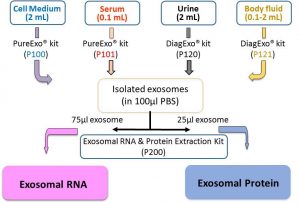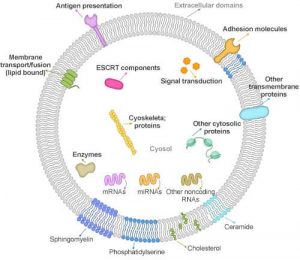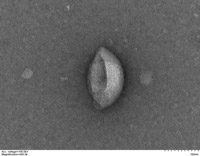Exosome isolation kits
A high-efficiency Cusabio exosome isolation kits can greatly help all exosome researchers. High purity, high yield, and easy operation make it an excellent research tool. As we know, exosomes are small membrane vesicles (30-150nm) of endocytic origin, which are shed from all types of cells under normal and pathophysiological conditions.
Exosomes have pleiotropic physiological and pathological functions and play an important role in various pathological conditions such as cancer, infectious and neurodegenerative diseases. Exosomes have received significant attention for their role in pathobiological processes and are being explored as a tool for disease diagnosis and management. Consequently, various isolation methods based on different principles have been developed for exosome isolation, such as differential ultracentrifugation, density gradient ultracentrifugation, ultracentrifugation, chromatography, magnetic bead immunoassay, polypolymer precipitation method, etc.
However, the quick and easy operation of exosome isolation kits is irreplaceable. CUSABIO exosome isolation kits purify exosomes by affinity purification. High purity exosomes and other Evs (extracellular vesicles) from the cell culture medium and body fluid (high yield by normal microfiltration) can be easily obtained by this method.

Product characteristics
- Suitable for many subsequent experiments
Experiments include Transmission Electron Microscope Analysis, Nanoparticle Tracking Analysis, NanoFCM Analysis, Western Blot, Quantitative Fluorescence (qPCR), High Throughput Sequencing, etc.
- Suitable for a variety of sample types
CUSABIO Exosome Isolation Kit provides a simple and reliable method to extract intact exosomes from cell culture supernatant, serum, plasma, breast milk, urine, saliva, yeast, plants.
- It can be used in the supernatant of a variety of cells.
CUSABIO exosome isolation kits are available to isolate exosomes from the supernatant of various cells, such as A375, HEPG2, PC-3, Hela, U87, MG63, etc.
- High purity
The exosomes extracted by the CUSABIO kits are complete, spherical or plate-shaped, with uniform particles. The vesicles are structurally intact. The following are part of the results.
- High performance
There are up to 3 x 1011 purified exosome particles per millilitre.
- High efficiency
The exosomes extracted by CUSABIO Exosome Isolation Kit are superior to the other three known brand kits and comparable to ultracentrifugation.
- Easy to use
No ultracentrifugation or phenol/chloroform step is required. No equipment is required. Just follow our protocol, you will get the exosomes soon.
- Competitive prices and excellent technical support
The prices of the CUSABIO exosome isolation kits are very competitive. We have an efficient production and management system so that we can manufacture top quality reagents at a lower cost and our customers can obtain better quotes. In addition, CUSABIO has a powerful technical support team and comprehensive after-sales service here to meet the needs of each purchase to make you worry-free and save time and energy for your research.

What are exosomes used for?
Exosomes contain cell-specific cargoes of nucleic acids, proteins, lipids, and metabolites, which facilitate intercellular communication that contributes to a spectrum of biological processes in health and disease. Exosomes are linked to immune responses, viral pathogenicity, chronic inflammation, neurodegenerative and cardiovascular diseases, including cancer progression. Furthermore, exosomes are designed to become therapeutic nanocarriers for the delivery of drugs and genes to the desired target, thus achieving therapeutic control of many diseases.
How do exosomes work?
Upon binding of the exosome to target cells through ligand-receptor interactions, the contents of the exosomes are internalized into the recipient cells. These biologically active molecules, such as proteins, lipids, and genetic materials, which mediate exosomal intercellular communication, ultimately reprogram recipient cells.
Are exosomes good or bad?
Exosomes play a dual role in human health. They maintain cell health by removing unwanted and damaged proteins and structures in cells. And they are also involved in immunity and reproduction in healthy individuals. However, cancer-derived exosomes participate in tumour growth, progression, spread, angiogenesis, and metastasis by transferring their cargoes of cytokines, mRNAs, and miRNAs to target cells. Resistance to cancer therapy is also attributed to exosomes of tumour origin. Furthermore, some exosomes are implicated in the pathogenesis of the disease, including neurodegenerative and cardiovascular diseases.
What is exosome therapy?
Exosome therapy is a form of regenerative treatment in which therapeutic payloads are delivered via exosomes to the affected site to achieve therapeutic effects. Therapeutic exosomes are delivered by injection or infusion to the treatment site, where they target and release their content of endogenous, modified bioactive molecules, such as miRNAs and proteins, into damaged cells or tissues, promoting faster healing and decreasing inflammation.
Are exosomes better than stem cells?
Compared to stem cells, exosomes are simpler, safer, cheaper, easier to store and transport. In terms of therapeutic effects, the exosome shows very low immunogenicity and does not trigger complications. Furthermore, exosomes cannot replicate, do not deteriorate, and are not infected by viruses.
